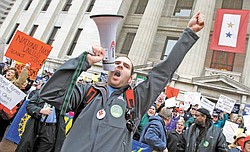Protesters to legislators: Don’t attack state’s unions
ASSOCIATED PRESS
Jason Petroff, of Chardon, leads cheers during a protest against Senate Bill 5 outside the Ohio Statehouse, Tuesday, Feb. 22, 2011, in Columbus, Ohio.
ASSOCIATED PRESS
Protesters gather at the Ohio Statehouse to voice their opposition to Senate Bill 5 on Tuesday, Feb. 22, 2011 in Columbus, Ohio. Officials have locked the doors to the Ohio Statehouse as thousands of union protesters gather on the grounds to oppose the bill that would strip public employees of collective bargaining rights. Ohio Public Safety spokesman Joe Andrews says about 1,000 people have been allowed into the Rotunda and Atrium for the committee hearing on the bill. Additional visitors are being directed to an off-site theater, where the meeting will be simulcast.
By Marc Kovac
COLUMBUS
Thousands of union protesters again descended on the Statehouse on Tuesday to oppose reforms to collective-bargaining laws being considered in the Republican-controlled Ohio Senate.
More than 5,000 packed Capitol Square, some allowed into the building but many others locked out, forced to stand outside.
They chanted “Kill the Bill” and other slogans in unison, they shouted individually and blew whistles and air horns, and they pleaded “Let Them In” to law-enforcement officials blocking entrance to sign-holding groups braving a blustery, snowy day.
Their message was much the same as it’s been for three other committee hearings: Stop attacking organized labor and start focusing on job creation.
“Senate Bill 5 is a misguided approach that will have a ripple effect throughout the work force, driving down wages, workers’ rights and benefits for all working families,” said Tim Burga, president of the Ohio AFL-CIO. “What we should be focused on is creating jobs in the private sector — jobs that will reduce our import-export deficit and stop the flow of jobs to China, Mexico and other markets that pay poverty wages.”
Senate Bill 5 would eliminate collective bargaining for state employees. Local governments, including school districts, still would be allowed to use collective bargaining, though public employers in fiscal emergency situations could modify, terminate or renegotiate agreements.
SB 5 also would require increased disclosure of compensation outlined in collective bargaining agreements and labor negotiations.
Gov. John Kasich supports the changes.
Proponents say the legislation is needed to allow state and local government offices to better control costs and reduce spending.
But union groups urged lawmakers to slow down consideration of the legislation and allow organized labor a place at the negotiation table.
“We ask, what’s the rush?” said Jay McDonald, president of the Fraternal Order of Police of Ohio. “If this is a good piece of legislation for the citizens Ohio, then it should be able to stand up to the light of day. ... A bill this complex, dealing with such a complex issue of Ohio law, deserves to have inspection. It deserves to have interested parties getting together, discussing what’s in the bill, what’s the intent of the bill, and if there are problems with the bill how best to fix those problems.”
“To my knowledge, this administration has not reached out to its public-employee unions and said ‘Hey, we’re in trouble; we’ve got a crisis on our hands and we need your help,’” said Dennis Duffey, representing the Ohio State Building and Construction Trades Council. “I don’t know any union, international or local, that has refused to sit down with an employer who has expressed a concern about the well-being of their business.”
Opponents of the legislation also said many unions have made concessions in recent years, freezing wages and agreeing to other cost-cutting measures.
“Everybody’s willing to make sacrifices,” said Democratic U.S. Rep. Tim Ryan of Niles, D-17th, on hand for Tuesday’s protest. “Gov. Strickland sat down with them last year; they made sacrifices, they made concessions. ... In each instance, public-sector folks are really helping solve the problem that they didn’t create, but they’re not going to give away all of their rights.”
He added, “I think it’s just ridiculous to ask them to do that. It’s unfair, and it’s clearly a political power grab.”
Former Gov. Ted Strickland and civil-rights leader Jesse Jackson also attended the protest Tuesday.
to show his support for organized labor.
 43
43


